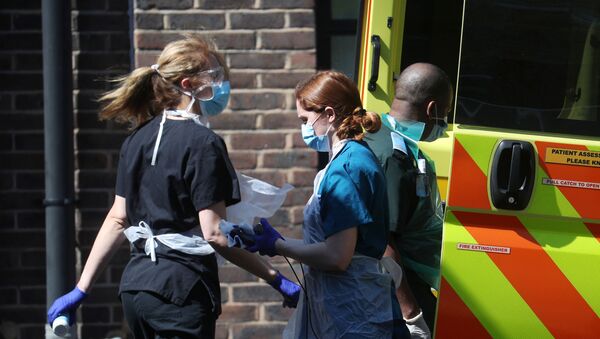The UK abandoned a mass coronavirus testing system in March because the government determined that the pandemic was already beyond control and cases had reached into the 100s of thousands, officials admitted on Friday.
Public Health England (PHE) directors spoke to the Science and Technology select committee Friday morning over Britain's failure to introduce a comprehensive testing system. The officials said they initially wanted to introduce South Korean-style "track and trace" measures in order to keep the outbreak user control.
Shortly after February, however, the number of infected with COVID-19 had reached a level so widespread that the UK simply did not have the capacity to test them all.
PHE bosses explained that it would not have been "worthwhile" to keep trying to identify and isolate every case of COVID-19 in the country. At the time, the government was only reaching 2,000 tests a day.
The medical director of Public Health England, Yvonne Doyle said that mass contact tracing "needed to cease in March".
"It was a decision that was come to because of the sheer scale of cases in the UK which had been introduced by multiple introductions, particularly after half term, from European countries we now know had large amounts of prevalence themselves", she explained.
During the half-term, Italian Alpine ski resorts saw multiple outbreaks and concerned the UK's schools, many of which had sent students there on excursions during the break.
"So contact tracing could not possibly have had the capacity to address that and, with the capacity of lab testing and our contact tracers, we felt the most important thing to do was to focus on where there was national concern, which was the capacity of the NHS, to accrue that testing", she added.
Prof Doyle and Britain's Director of Health Improvement John Newton insisted that dropping the South Korean approach was a government decision.
He said that PHE had done everything to increase testing capacity, but the Department for Health ultimately determines strategy. PHE plays a role but strategic coordination is up to the Government.
In April, Prof Doyle said that they were looking to get testing underway "as soon as we can". Throughout the same month, Health Secreatary Matt Hancock had been pushing to increase the daily number of tests to 100,000.
"As soon as we can, we want to be out there doing these tests."
— SkyNews (@SkyNews) April 1, 2020
PHE Medical Director Dr Yvonne Doyle says antibody tests are currently being tested to make sure they provide an accurate result before they are rolled out.
Get the latest: https://t.co/KbCoBJ14Pv pic.twitter.com/ZUkIThgDBO
England's chief medical officer, Professor Chris Whitty, publicly announced on 12 March that the government would not conduct coronavirus tests outside of hospitals.
On 7 February, PHE said that "the risk to individuals remains low" despite the outbreak in China, where the virus was first identified, reaching over 100 deaths at that stage.
Experts have criticised the government's approach, saying that better and more widespread testing would have been able to help contain the pandemic and save lives.
South Korea has received praise worldwide for its intense testing and isolation of anyone found or suspected of having COVID-19. This meant that the cases were contained in small controllable areas and a relatively low number of confirmed cases.
As of Friday, South Korea has 11,142 confirmed cases, while the UK stands are 251,000.
The United Kingdom has begun trials of 20-minute testing kits amid fears of a projected second wave of coronavirus infections.


